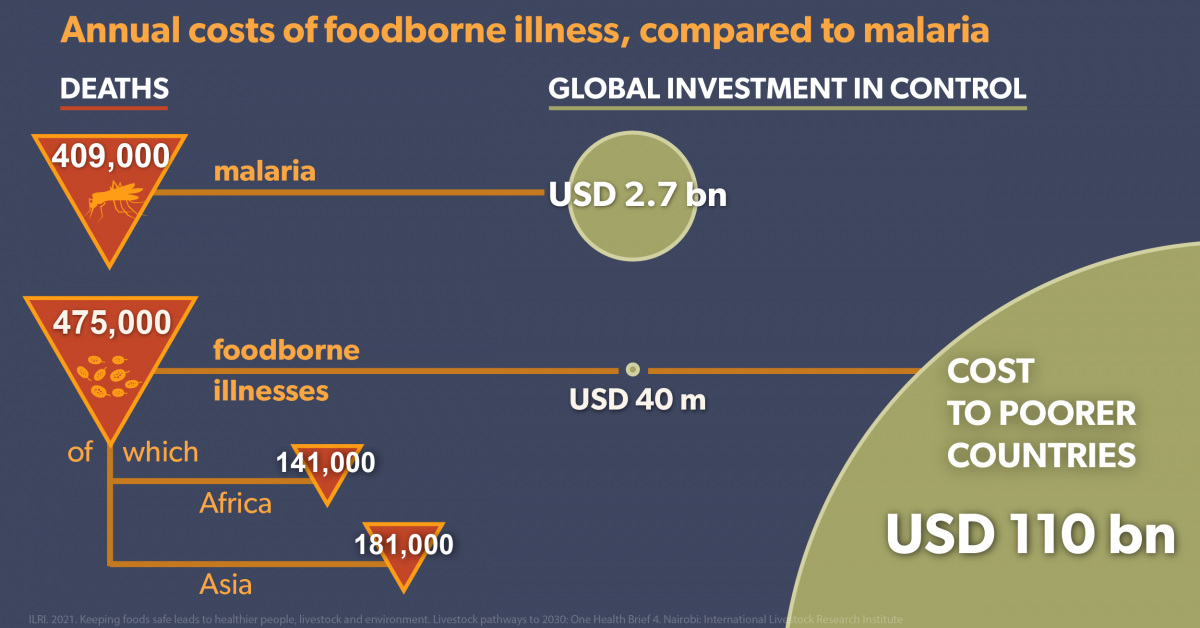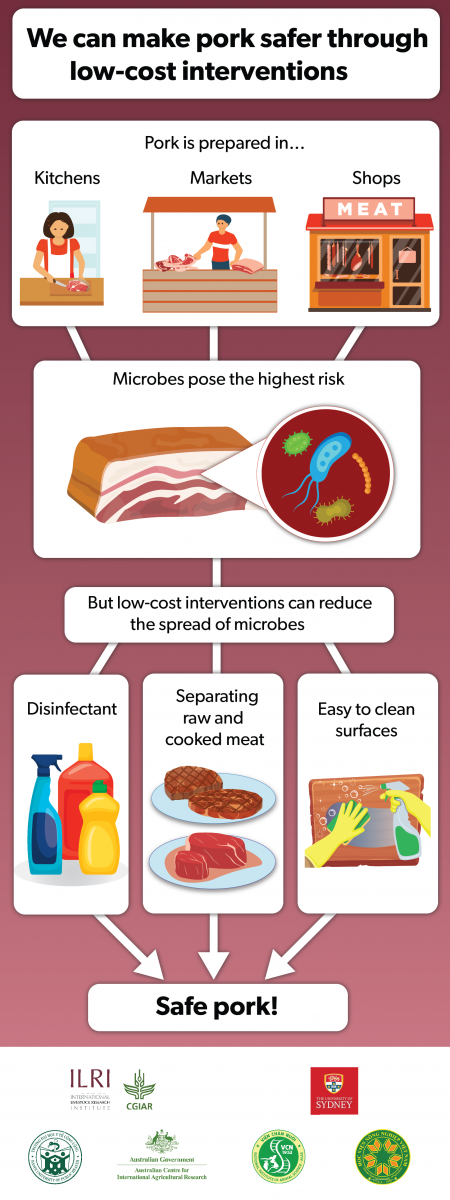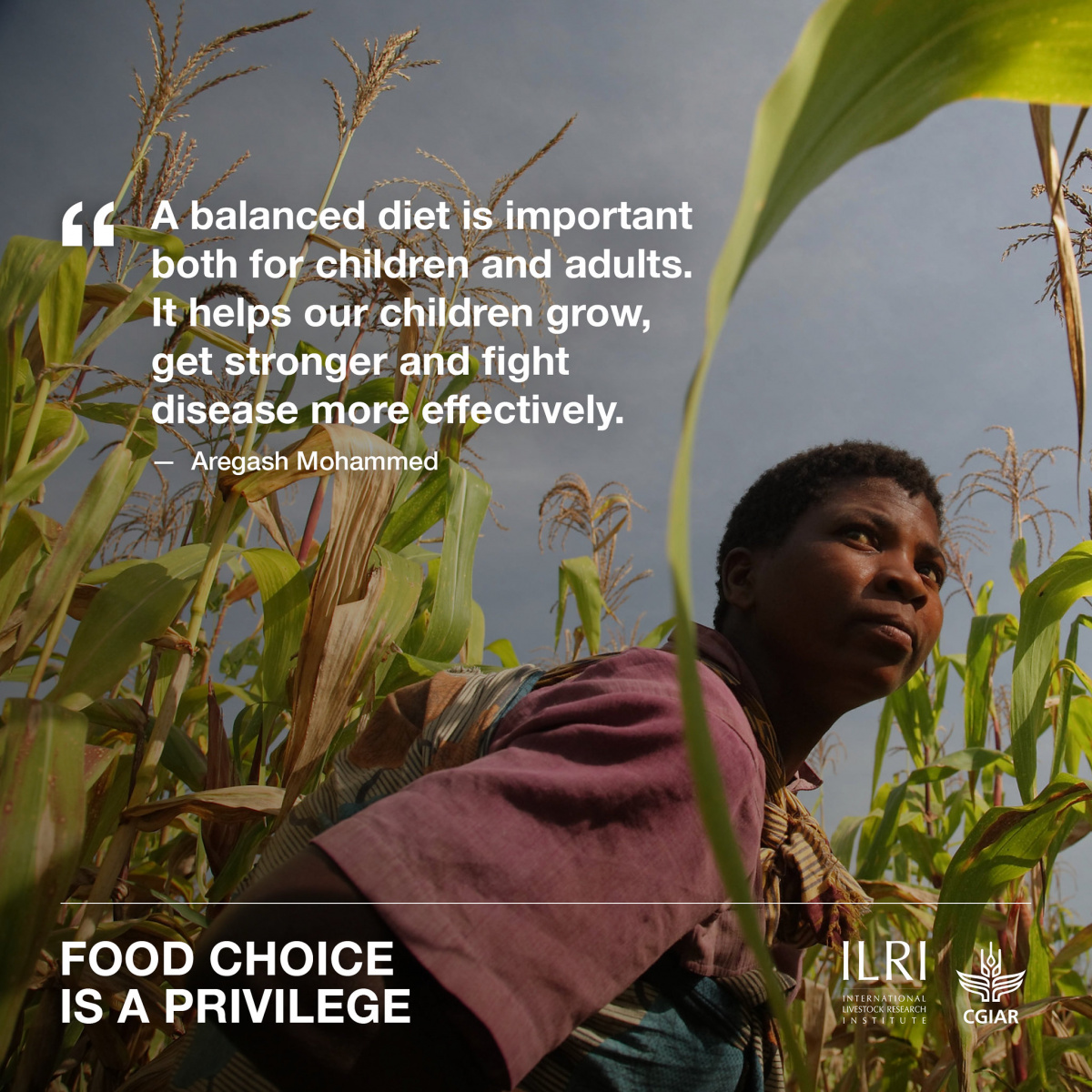

World Food Safety Day 2022
In 2018, the United Nations established World Food Safety Day to raise awareness on food safety and inspire action to help prevent and manage foodborne risks thereby contributing to human health, food and nutrition security, economic prosperity, market access and sustainable development.
This year, the International Livestock Research Institute (ILRI) joins the rest of the world to mark World Food Safety Day on Tuesday 7 June 2022 under the theme Safer food, better health.
On this page, we showcase ILRI’s long-standing collaborative research on food safety in low- and middle-income countries. Better management of foodborne diseases could save nearly half a million lives a year and safeguard the livelihoods of over one billion small-scale livestock producers.
Our approach to food safety research is based on risk analysis. We identify the hazards in food and build the capacity of policymakers to understand risk-based approaches. Policy will be more effective and efficient if based on actual risk to human health rather than the presence of hazards. We generate evidence and develop solutions to improve the safety of animal products in informal food markets.
Key food safety messages
The magnitude of the global public health burden due to foodborne diseases is comparable to that of HIV/AIDS, malaria or tuberculosis, and most of this burden is in low- and middle-income countries. It's conservatively estimated that 141,000 deaths and 91 million acute illnesses occur annually in Africa from foodborne hazards, with the African region having the world's highest per capita incidence of foodborne illness.

It's estimated that more than 600 million people fall ill and 475,000 die every year from eating food contaminated with bacteria, viruses, parasites, toxins or chemicals. According to the World Bank, unsafe food costs low-and middle-income economies alone about USD 110 billion in lost productivity and medical expenses annually. Unsafe food also limits trade.
Hazards are not the same as risks. The mere existence of pathogens in food is not necessarily an indication that consumers are at risk. In many parts of Africa, it’s common knowledge that certain foods may contain hazards and common practice to neutralize them by thoroughly cooking or, with milk, through boiling. In Ethiopia, traditional fermentation of milk has been found to provide a 200-fold reduction in the risk of Staphylococcus poisoning. A focus on risks is therefore more effective at ensuring safer food.
Pork is the most important animal food product in Cambodia and Vietnam. It is primarily processed and sold in traditional slaughterhouses and wet markets which, while addressing local consumer demand, often suffer from poor hygiene. Pilot tests have shown that simple interventions to improve hygiene during food handling in slaughterhouses and markets can enhance the safety of pork.

If it is not safe, it is not food. Food security is achieved when all people, at all times, have physical and economic access to food that meets their dietary needs for an active and healthy life. In fact, food safety is a critical part of the utilization component of the four dimensions of food security – availability, access, utilization and stability.
Undernutrition and foodborne diseases are related. Infectious foodborne diseases commonly manifest as diarrhoea, which is strongly associated with stunting. Children under the age of five years are at a higher risk of malnutrition and death due to unsafe food and carry 40 percent of the burden of foodborne disease. Studies have found an association between aflatoxin exposure and stunting. Safe food allows for the uptake of nutrients and promotes long-term human development and achievement of the Sustainable Development Goals.

The health of people is intricately connected to the health of animals and the environment. Pathogens transmissible from animals to people through direct contact or through food, water and the environment have an impact on public health and socio-economic well-being. The safety of food is affected by the health of animals, plants and the environment within which it is produced. By working together through a holistic One Health approach, governments, food producers, academia, researchers, and non-governmental and international organizations can effectively combat food safety risks such as antimicrobial resistance.
Safe food allows for suitable uptake of nutrients and promotes long-term human development. Safe food production improves sustainability by enabling market access and productivity, which drives economic development and poverty alleviation, especially in rural areas.
Nutrition and health experts have a key role to play in ensuring that food systems produce affordable, nutritious and safe food in an equitable manner that safeguards environmental sustainability. Although COVID-19 is not transmitted by food, the impact of the pandemic has disrupted the global agri-food system and demonstrated the importance of planning in advance. As part of preparation for the next pandemic, governments should prioritize minimizing disruptions in the food supply chains, as consumers must always have reliable access to safe food. To build back better, we need to collaborate across disciplines, sectors and borders.
Food safety is everyone’s responsibility and therefore everyone’s business. Today, food is processed in greater volumes and distributed over greater distances than ever before. Collaboration is therefore essential across sectors within communities, businesses, governments and across borders, to ensure the availability of safe food around the world in a sustainable manner now and in the future. Good governance and regulations are also key to food safety.
Selected publications
World Health Organization global estimates and regional comparisons of the burden of foodborne disease in 2010
- Havelaar, A.H.
- Kirk, M.D.
- Torgerson, Paul R.
- Gibb, H.J.
- Hald, T.
- Lake, R.J.
- Praet, N.
- Bellinger, D.C.
- Silva, N.R. de
- Gargouri, N.
- Speybroeck, N.
- Cawthorne, A.
- Mathers, C.
- Stein, C.
- Angulo, F.J.
- Devleesschauwer, Brecht

The safe food imperative: Accelerating progress in low- and middle-income countries
- Jaffee, Steven
- Henson, Spencer
- Unnevehr, Laurian J.
- Grace, Delia
- Cassou, Emilie
Experts working on food safety
Events
African Union Commission virtual commemoration of World Food Safety Day
Monday 6 June 2022, 1200–1500 hours EAT
Tuesday 7 June 2022, 1400–1630 hours EAT
The objectives of the virtual events are to
- raise awareness and mobilize collective action to improve food safety in Africa;
- share experiences and solutions for addressing Africa’s food safety challenges; and
- identify key actions and strategies to address current and future challenges to food safety in Africa.
Participants will include member states, regional economic communities, civil society organizations and continental/regional farmer and trader associations.
Interpretation: The events will be conducted in English, French, Portuguese and Arabic.
Register at https://zoom.us/webinar/register/WN_g99FVHHlRX2C-b2AlJ4i2g
EatSafe's WHO Health Talk: Enabling safer food in traditional markets
Wednesday 8 June 2022, 1300–1400 hours CET
Traditional food markets are unique environments where millions of people access nutritious foods every day across the globe.
These markets account for the largest distribution share of fresh foods in low- and middle-income countries, foods that are essential for improved nutrition outcomes in the communities they serve.
At the same time, the health burden of unsafe food is unequally distributed among countries, with the greatest impacts in low- and middle-income countries. Deeper understanding of traditional markets is essential for risk management of foodborne hazards.
This webinar will discuss ways to create an enabling environment to best adopt new tools and approaches to improve food safety in traditional markets that can help decrease the burden of foodborne disease.
This webinar is one of several Health Talks presented by the World Health Organization in celebration of World Food Safety Day 2022.
Register at https://www.gainhealth.org/events/eatsafes-who-health-talk-enabling-safer-food-traditional-markets
Arrell Food Summit: Public lecture and discussion on food systems, food safety and health
Thursday 9 June 2022, 1100–1300 hours EDT
Join the Arrell Food Institute in partnership with the University of Guelph One Health Institute for an event with world renowned epidemiologist, veterinarian and Arrell Global Food Innovation Research Award winner, Delia Grace Randolph. She will be discussing a journey of several decades to provide an understanding of foodborne disease and how best to manage it. Our world is not well fed and while hunger has been decreasing over the last decades, communicable and non-communicable diseases are trending upwards. The best estimates indicate that the health burden of foodborne disease is equivalent to that of malaria, HIV/AIDs or tuberculosis and the cost to low- and middle-income countries is more than 100 billion USD a year. Most of the global health burden of foodborne disease originates in animal source food and fresh vegetables sold in the informal, traditional markets of developing countries. Alleviating this burden also benefits nutrition, incomes, equity and the environment.
About the speaker
Delia Grace Randolph is professor of food safety systems, Natural Resources Institute, University of Greenwich and joint-appointed scientist at the International Livestock Research Institute. She is a renowned scientist with unique and transformative impacts on the safety of food systems and public health in developing countries. As a trained veterinarian and epidemiologist, she brings a special expertise on the interconnectedness of animal health, human health and eco-health to her work. A focus of her work is improving food safety in informal markets in developing countries.
Her career has spanned the private sector, field-level community development and aid management, as well as research. She has lived and worked in Asia, west and east Africa and authored or co-authored more than 200 peer-reviewed publications as well as training courses, briefs, films, articles and chapters.
More information and resources
Gibb, H.J. et al. 2019. Estimates of the 2015 global and regional disease burden from four foodborne metals – arsenic, cadmium, lead and methylmercury. Environmental Research 174: 188–194.
Havelaar, A.H. et al. 2015. World Health Organization global estimates and regional comparisons of the burden of foodborne disease in 2010. PLOS Medicine 12(12): e1001923.
Keeping foods safe leads to healthier people, livestock and environment
















